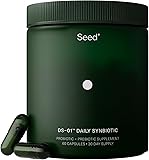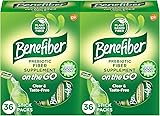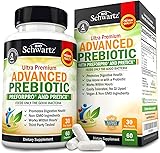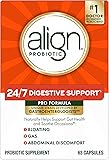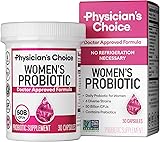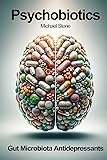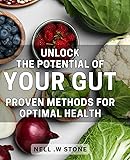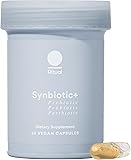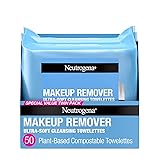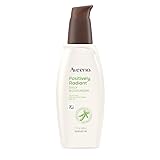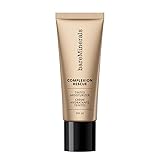The importance of Probiotics
Probiotics are live microorganisms that can provide health benefits when consumed in adequate amounts. They are often referred to as “good” or “friendly” bacteria because they help keep your gut healthy.
What Are Probiotics?
Probiotics are beneficial bacteria that live in your digestive tract. They are found in certain foods, supplements, and fermented products like yogurt, kefir, and sauerkraut.

Importance of Microorganisms for Your Gut
Your gut is home to trillions of microorganisms, including bacteria, viruses, fungi, and other microbes. These microorganisms play a crucial role in digestion, immune function, and overall health.
Prebiotics vs. Probiotics: What’s the Difference?
What Are Prebiotics?
Prebiotics are non-digestible fibers that serve as food for probiotics. They promote the growth and activity of beneficial bacteria in your gut.
Last update on 2025-02-10 / Affiliate links / Images from Amazon Product Advertising API, This article contains affiliate links to products on Amazon. As an Amazon Associate, I earn from qualifying purchases. This means that if you click on an affiliate link and make a purchase, I may receive a small commission at no extra cost to you. These commissions help support the content and operations of this website. Thank you for your support!
What Are Synbiotics?
Synbiotics are products that combine both probiotics and prebiotics to enhance the survival and implantation of live bacteria in your gut.
Last update on 2025-02-10 / Affiliate links / Images from Amazon Product Advertising API, This article contains affiliate links to products on Amazon. As an Amazon Associate, I earn from qualifying purchases. This means that if you click on an affiliate link and make a purchase, I may receive a small commission at no extra cost to you. These commissions help support the content and operations of this website. Thank you for your support!
Are Prebiotics the Same as Probiotics?
No, prebiotics are not the same as probiotics. While probiotics are live bacteria, prebiotics are fibers that feed these bacteria. Together, they work synergistically to support gut health.
Health Benefits of Probiotics
Last update on 2025-02-10 / Affiliate links / Images from Amazon Product Advertising API, This article contains affiliate links to products on Amazon. As an Amazon Associate, I earn from qualifying purchases. This means that if you click on an affiliate link and make a purchase, I may receive a small commission at no extra cost to you. These commissions help support the content and operations of this website. Thank you for your support!
Impact on Digestive Health
Probiotics are known to improve digestive health by balancing the gut microbiome, which can help prevent and treat conditions like diarrhea, irritable bowel syndrome (IBS), and inflammatory bowel disease (IBD).
Research suggests that certain strains of probiotics may help with weight loss by influencing appetite, fat storage, and metabolism.
Health Benefits of Prebiotics and Probiotics
Both prebiotics and probiotics contribute to a healthy gut, support immune function, and may reduce the risk of chronic diseases such as heart disease and diabetes.
Other Health Benefits
Probiotics have been linked to various other health benefits, including improved mental health, reduced allergy symptoms, and enhanced skin health.
The Rise of Psychobiotics
Psychobiotics are a class of probiotics that have a positive impact on mental health by influencing the gut-brain axis. They may help reduce symptoms of anxiety, depression, and stress.
- Written by the leading researchers in the field, this information-rich guide to…
- This groundbreaking book explains the revolutionary new science of psychobiotics and…
- Leading medical researchers John F
- Cryan and Ted Dinan, working with veteran journalist Scott C
- Anderson, explain how common mental health problems, particularly depression and…
- Unlock the Secrets to Mental Wellness with “Psychobiotics: Gut Microbiota…
- Practical Insights: Learn how to incorporate psychobiotics into your diet and…
- Holistic Approach: Understand the mind-body connection and how nurturing your gut can…
- Expert Guidance: Benefit from the knowledge and experience of leading researchers in…
- Don’t miss out on the future of mental wellness
Last update on 2025-02-10 / Affiliate links / Images from Amazon Product Advertising API, This article contains affiliate links to products on Amazon. As an Amazon Associate, I earn from qualifying purchases. This means that if you click on an affiliate link and make a purchase, I may receive a small commission at no extra cost to you. These commissions help support the content and operations of this website. Thank you for your support!
Are There Health Benefits of Probiotics for Children?
Probiotics can be beneficial for children, particularly in preventing and treating conditions like colic, eczema, and respiratory infections.
Foods to Help You Ease Bloating
Certain probiotic-rich foods, such as yogurt and kefir, can help ease bloating by promoting healthy digestion and reducing gas production.
Top Foods High in Probiotics
Some of the best sources of probiotics include fermented foods like yogurt, kefir, sauerkraut, kimchi, and miso.
Last update on 2025-02-10 / Affiliate links / Images from Amazon Product Advertising API, This article contains affiliate links to products on Amazon. As an Amazon Associate, I earn from qualifying purchases. This means that if you click on an affiliate link and make a purchase, I may receive a small commission at no extra cost to you. These commissions help support the content and operations of this website. Thank you for your support!
Scientific Research and Effectiveness
What Has Science Shown About the Effectiveness of Probiotics for Health Conditions?
Probiotics have been extensively studied for their potential to treat and prevent various health conditions. Here’s what the research shows:
Gastrointestinal Conditions
- Antibiotic-Associated Diarrhea
- Clostridium Difficile Infection
- Constipation
- Diarrhea Caused by Cancer Treatment
- Diverticular Disease
- Inflammatory Bowel Disease
- Irritable Bowel Syndrome
- Traveler’s Diarrhea
Conditions in Infants
- Infant Colic
- Necrotizing Enterocolitis
- Sepsis in Infants
Dental Disorders
- Dental Caries (Tooth Decay)
- Periodontal Diseases (Gum Disease)
Conditions Related to Allergy
- Allergic Rhinitis (Hay Fever)
- Asthma
- Atopic Dermatitis
- Prevention of Allergies
Other Conditions
- Acne
- Hepatic Encephalopathy
- Upper Respiratory Infections
- Urinary Tract Infections
COVID-19 and Probiotics
Emerging research is exploring the potential role of probiotics in supporting immune function and reducing the severity of COVID-19 symptoms.
How Might Probiotics Work?
Probiotics work by restoring the natural balance of bacteria in your gut, which can be disrupted by illness, stress, poor diet, and the use of antibiotics.
Last update on 2025-02-10 / Affiliate links / Images from Amazon Product Advertising API, This article contains affiliate links to products on Amazon. As an Amazon Associate, I earn from qualifying purchases. This means that if you click on an affiliate link and make a purchase, I may receive a small commission at no extra cost to you. These commissions help support the content and operations of this website. Thank you for your support!
Probiotics can produce substances that inhibit the growth of harmful bacteria, stimulate the immune system, and strengthen the gut barrier.
Probiotics Safety and Side Effects
Safety and Side Effects
Probiotics are generally considered safe for most people, but they can cause side effects in some cases, particularly in people with weakened immune systems.
Probiotics Side Effects
Common side effects of probiotics include gas, bloating, and mild digestive upset, which usually subside as your body adjusts to the supplement.
How to Use Them Safely
To use probiotics safely, start with a low dose and gradually increase it. If you have any underlying health conditions, consult your healthcare provider before starting a probiotic regimen.
Can Probiotics Be Harmful?
While probiotics are safe for most people, they can be harmful to those with severe illnesses or compromised immune systems, leading to infections or other complications.

Exactly How Safe Are Probiotics for You?
The safety of probiotics depends on the strain, dose, and individual health status. Most healthy individuals can use them without significant risks.
New Research on Probiotic Safety
Ongoing research is focused on understanding the safety of probiotics, particularly in vulnerable populations such as infants, the elderly, and those with chronic illnesses.
Lack of Safety Data Contributes to Funding Concerns
The lack of comprehensive safety data has raised concerns about the funding and regulation of probiotics, highlighting the need for more rigorous studies.

Taking Probiotics May Have Benefits and Risks
While probiotics offer many potential benefits, it’s essential to weigh the risks, especially if you have underlying health conditions.
What Does the Research Say?
Research supports the benefits of probiotics for many health conditions, but it also underscores the importance of choosing the right strain and using them appropriately.
Choosing and Using Probiotics
How to Choose the Right Probiotic for You
Choosing the right probiotic involves considering the specific health benefits, the strain of bacteria, and the quality of the product.
Last update on 2025-02-10 / Affiliate links / Images from Amazon Product Advertising API, This article contains affiliate links to products on Amazon. As an Amazon Associate, I earn from qualifying purchases. This means that if you click on an affiliate link and make a purchase, I may receive a small commission at no extra cost to you. These commissions help support the content and operations of this website. Thank you for your support!
Choosing Probiotics
When selecting a probiotic, look for one that has been tested for safety and efficacy, contains live and active cultures, and has a high colony-forming unit (CFU) count.
How to Ensure Your Probiotic Will Work
To ensure your probiotic works effectively, store it properly, take it consistently, and follow the recommended dosage.
Why Your Probiotic May Not Work or May Take Longer to Work
Several factors can influence the effectiveness of probiotics, including the strain, dosage, individual health status, and how the product is stored.
How Long Does It Take for Probiotics to Work?
Probiotics can take anywhere from a few days to several weeks to show results, depending on the condition being treated and the individual’s response.
How Are Probiotics Regulated in the United States?
In the U.S., probiotics are regulated as dietary supplements, which means they are not subject to the same rigorous testing as prescription medications. It’s important to choose products from reputable brands that follow good manufacturing practices.

Learning About Probiotics and the Microbiome
Learning About the Microbiome
The microbiome is the collection of all microorganisms living in and on your body. It plays a crucial role in your health, influencing everything from digestion to immune function.
Probiotics: What You Need to Know
Probiotics can support a healthy microbiome by adding beneficial bacteria to your gut. However, not all probiotics are created equal, so it’s essential to understand what you’re taking.
What Types of Bacteria Are in Probiotics?
Probiotics typically contain strains of bacteria from the Lactobacillus and Bifidobacterium families, which are known for their gut health benefits.
Types of Probiotics
Probiotics come in various forms, including capsules, powders, and fermented foods. The type of probiotic you choose will depend on your health goals and preferences.
What Do They Do?
Probiotics help maintain a balanced gut microbiome, support digestion, and boost the immune system. They may also offer specific benefits depending on the strain.
Probiotics have gained popularity in recent years due to increasing awareness of gut health and their potential benefits for various health conditions.
Disclaimer
The information provided in this article is for general informational purposes only and is not intended as medical advice. Always consult with your doctor or a qualified healthcare provider before making any changes to your diet, exercise routine, or health regimen. Individual needs may vary, and your doctor can provide personalized advice based on your specific health conditions and requirements. This article does not replace professional medical advice, diagnosis, or treatment. Use of the information in this article is at your own risk

